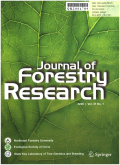- 钛学术文献服务平台 \
- 学术期刊 \
- 农业科学期刊 \
- 林业期刊 \
- 林业研究(英文版)期刊 \
Overexpression of Arabidopsis thaliana cysteine2/histidine2-type transcription factor 6 gene enhances plant resistance to a bacterial pathogen
Overexpression of Arabidopsis thaliana cysteine2/histidine2-type transcription factor 6 gene enhances plant resistance to a bacterial pathogen
基本信息来源于合作网站,原文需代理用户跳转至来源网站获取
摘要:
Transcription factors can be used to engi-neer plants for enhanced productivity.However,the mechanism(s) by which the C2H2-type zinc finger transcrip-tion factor enhances pathogen resistance in cells is not fully understood.Here,Agrobacterium tumefaciens carrying the gene for Arabidopsis thaliana cysteine2/histidine2-type tran-scription factor 6 (ZAT6) was used to engineer rice (Oryza sativa L.),cotton (Gossypium hirsutum L.),and slash pine(Pinus elliottii Engelm.) to generate transgenic cell lines.Transgenic cells were then inoculated with the pathogenic bacterium Pseudomonas syringae.Compared to the con-trol,cell viability of transgenic cells increased 39-47% and growth rate increased 9-15% by 7 days after inoculation in rice,cotton and slash pine.Acid phosphatase activity and alkaline phosphatase activity and transcript levels of Ca2+-dependent protein kinase genes OsCPK1,OsCPK2,OsCPK6,and OsCPK8 and mitogen-activated protein kinase genes OsMAPK1,OsMAPK2,OsMAPK3,and OsMAPK8 increased significantly in transgenic rice cells by 3 day after inoculation,and extracellular pH had decreased by 10-14%by 96 min after inoculation in transgenic rice,cotton and slash pine cells.These results suggest that ZAT6 enhances P.syringae resistance in plant cells by modulating transcription of CPK and MAPK and oxidase activity.

推荐文章
天山北麓中段拟南芥(Arabidopsis thaliana)与相邻物种的分布格局及相互关系
拟南芥(Arabidopsis thaliana)
短命植物
种子扩散
自然选择
点格局分析
生态因子及其交互作用对拟南芥(Arabidopsis thaliana)表型可塑性的影响
拟南芥(Arabidopsis thaliana)
表型可塑性
生态因子交互作用
Type-2三角形隶属函数的模糊系统仿真
二型模糊系统
MATLAB
隶属函数
Identification of bacterial fossils in marine source rocks in South China
South China
Excellent marine source rocks
Bacterial fossil
Sedimentary environment
内容分析
关键词云
关键词热度
相关文献总数
(/次)
(/年)
引文网络
引文网络
二级参考文献 (15)
共引文献 (0)
参考文献 (52)
节点文献
引证文献 (0)
同被引文献 (0)
二级引证文献 (0)
1993(1)
- 参考文献(0)
- 二级参考文献(1)
1995(1)
- 参考文献(0)
- 二级参考文献(1)
1996(1)
- 参考文献(1)
- 二级参考文献(0)
1998(3)
- 参考文献(3)
- 二级参考文献(0)
1999(2)
- 参考文献(2)
- 二级参考文献(0)
2000(1)
- 参考文献(1)
- 二级参考文献(0)
2002(2)
- 参考文献(0)
- 二级参考文献(2)
2003(3)
- 参考文献(3)
- 二级参考文献(0)
2004(5)
- 参考文献(4)
- 二级参考文献(1)
2005(5)
- 参考文献(2)
- 二级参考文献(3)
2006(2)
- 参考文献(2)
- 二级参考文献(0)
2007(6)
- 参考文献(6)
- 二级参考文献(0)
2008(3)
- 参考文献(2)
- 二级参考文献(1)
2009(2)
- 参考文献(2)
- 二级参考文献(0)
2010(3)
- 参考文献(1)
- 二级参考文献(2)
2011(2)
- 参考文献(2)
- 二级参考文献(0)
2012(5)
- 参考文献(2)
- 二级参考文献(3)
2013(3)
- 参考文献(3)
- 二级参考文献(0)
2014(4)
- 参考文献(4)
- 二级参考文献(0)
2015(5)
- 参考文献(4)
- 二级参考文献(1)
2016(5)
- 参考文献(5)
- 二级参考文献(0)
2017(3)
- 参考文献(3)
- 二级参考文献(0)
2021(0)
- 参考文献(0)
- 二级参考文献(0)
- 引证文献(0)
- 二级引证文献(0)
引文网络交叉学科
相关学者/机构
期刊影响力
林业研究(英文版)
主办单位:
东北林业大学
中国生态学学会
出版周期:
双月刊
ISSN:
1007-662X
CN:
23-1409/S
开本:
大16开
出版地:
哈尔滨市动力区和兴路26号(林大123信箱)
邮发代号:
创刊时间:
1990
语种:
eng
出版文献量(篇)
2459
总下载数(次)
1
总被引数(次)
7852
期刊文献
相关文献
推荐文献
- 期刊分类
- 期刊(年)
- 期刊(期)
- 期刊推荐
林业研究(英文版)2022
林业研究(英文版)2021
林业研究(英文版)2020
林业研究(英文版)2019
林业研究(英文版)2018
林业研究(英文版)2017
林业研究(英文版)2016
林业研究(英文版)2015
林业研究(英文版)2014
林业研究(英文版)2013
林业研究(英文版)2012
林业研究(英文版)2011
林业研究(英文版)2010
林业研究(英文版)2009
林业研究(英文版)2008
林业研究(英文版)2007
林业研究(英文版)2006
林业研究(英文版)2005
林业研究(英文版)2004
林业研究(英文版)2003
林业研究(英文版)2002
林业研究(英文版)2001
林业研究(英文版)2000
林业研究(英文版)1999

 免费查重
免费查重










